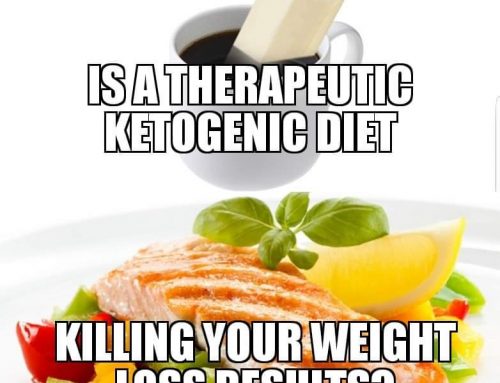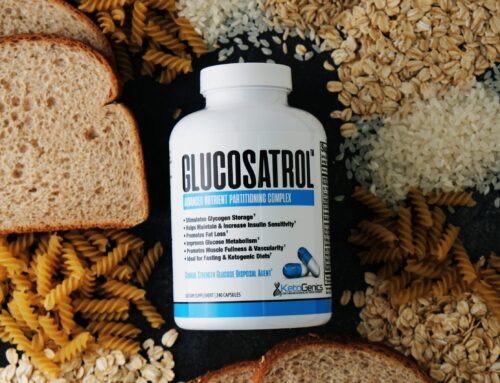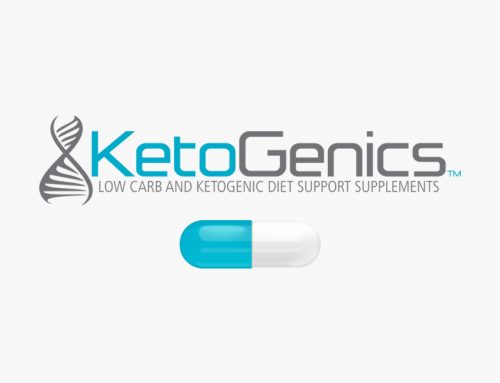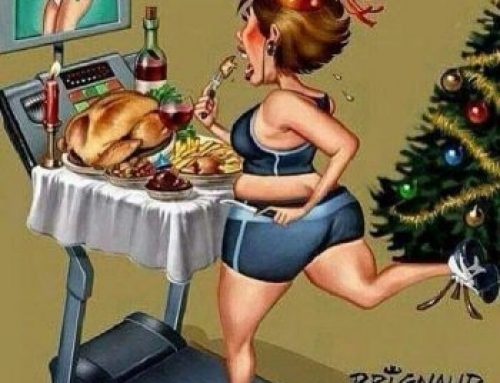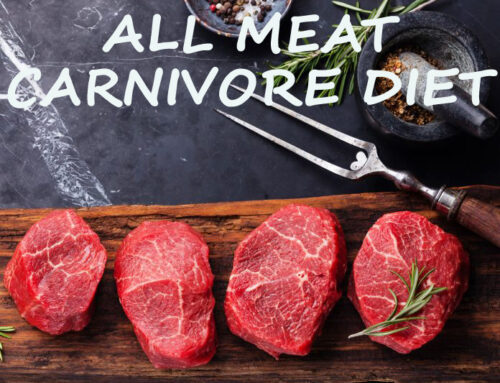Breaking a Stall on a Ketogenic Diet
On a ketogenic diet, your body will lose a lot of water weight in the first couple of days due to carbohydrate restriction, but fat loss depends primarily on calorie intake. Since weight loss is not linear and doesn’t happen at a constant rate, there are bound to be plateaus or stalls or periods of times when the scale just won’t budge; but this doesn’t mean you have stalled.
Your body loses a lot of water weight (scale weight) the 1st few days or weeks of a ketogenic diet, the scale loss numbers are rather big. After your body adjusts to the ketogenic diet and starts to burn/lose mainly fat (as long as you are in a caloric deficit) the scale numbers seem much lower. But this is not bad.
For example, if you lost 7lbs the 1st week, 5 lbs the 2nd week and only 2 lbs
the 3rd week…chances are the 1st and 2nd week was mostly water and maybe you only lost 2lbs of fat. So in this case you are still doing good and you are on track, you are not stalled nor did your “fat” loss slow down. Your “weight loss” did but we only care about “fat loss”.
That is why using a scale to gauge your fat loss progress is near useless and stressful since the numbers do not tell you what is truly going on.
Now let’s say you have been on the diet a while 6-8+ weeks and you no longer see “scale weight” loss, again it doesn’t matter but work with me for a bit here. If you are exercising you probably put on some muscle. For example lets say you lost 1lb of fat and gained 1lb of muscle in a week…the scale shows ZERO change, BUT you still lost fat 🙂 This is a good thing! (can you see the trend here?- ditch the scale). Use the mirror and how clothes fit to track your progress.
So far the “stall” is not yet a stall since you are still losing fat.
But what happens when you really hit a true stall or a plateau? Clothes are not fitting better in fact maybe they are tighter? You do not look any better in the mirror for the past few weeks. What is going on here is closer to a true stall than anything else. Sometimes stalls are just part of the process and you need to wait it out.
Whoosh Effect
Another thing that may be going on is that your body is about to experience the “whoosh effect” which will sneak up on you one day and you all of a sudden lose a few pounds or more on the scale. This happens after your fat cells that have held onto water for a period of time finally release it and a decent amount of scale weight drops off. But it is water, not fat but it still makes you feel good to see the numbers dropping again.
Tracking Macros
After all these things are accounted for and you are still not losing weight then it is time to look at your macros; Fat, Protein and carbs. How much of each are you eating in grams and ultimately how many calories per day.
Since a ketogenic diet is naturally appetite suppressing, most people do not count calories and are still able to lose fat because they are just not eating a lot. They naturally eat under their daily caloric maintenance. But some people are actually eating more than they should and here is where the math needs to be done.
When you do not track your food and you are stalled that means a few things are happening:
1) you are eating too much fat, even though you think you aren’t.
2) you are eating too many carbs, even though you think you aren’t. (hidden carbs, “ketofied” foods etc)
3) you are eating too many calories
4) not getting adequate electrolytes
5) eating too many “trigger foods” – nuts, dairy, nut butters; foods that cause you to eat too much or cause inflammation which makes you retain water. (A good probiotic is the first line of defense for inflammation)
6) you are not moving (exercising) enough. There are 2 parts of the energy balance equation; calories in/calories out. You may have a grasp on the “in” but your “output” is too low; start moving/exercising more.
7) you have been dieting (in a caloric deficit) too long
So the obvious questions are; Why should you adjust your macros? How were you able to lose fat in the first place without worrying about your macros?
A few things happen when you are in the process of keto adaptation, as we have seen there is a lot of water loss.
There is often a decrease in inflammation on a keto diet so even more scale weight/water loss.
You eat less. Probably the biggest benefit of a ketogenic diet with adequate protein is the natural appetite suppressant effect of the diet. You do not track calories but you end up eating less than you would have on a non keto diet, you eat under your maintenance calories and you lose weight.
You are increasing your insulin sensitivity so you are better able to handle the food/carbs you eat. This is seen often in women with PCOS who lose a LOT of weight once they increase their insulin sensitivity.
Increased Insulin sensitivity
Insulin sensitivity is very important to fat loss because if you are insulin resistant your body is more likely to store energy (the food you at) as fat. Increasing insulin sensitivity also reduces inflammation which helps drop a lot of water weight. Increased insulin sensitivity will help you better utilize the carbs, albeit a small amount on keto, and not readily store them as fat.
One of the greatest benefits seen from a ketogenic diet is the increased insulin sensitivity many experience especially in type 2 diabetics. In Fact a study showed that the combination of Fish oils and a ketogenic diet reduced patients average insulin concentration by 43%. The study also showed that fish oil is also beneficial for lowering triglycerides and reducing inflammation! Which as mentioned above can mask your weight loss if not halt it for a while.
Ref: Paoli, Antonio, et al. “Effects of n-3 Polyunsaturated Fatty Acids (ω-3) Supplementation on Some Cardiovascular Risk Factors with a Ketogenic Mediterranean Diet.” Marine drugs 13.2 (2015): 996-1009
This small study resulted in a 75% increase in insulin sensitivity in test subjects following a ketogenic diet. Ref: https://www.ncbi.nlm.nih.gov/pubmed/15767618
So we know keto has some benefits and increasing insulin sensitivity is one of them BUT when all the magical benefits of keto come to a halt; that means your lack of tracking macros has caught up to you and it is time for an adjustment.
Improper Calorie Tracking
Studies have shown that dieters who claim they track their food intake with precision are often off by as much as 30-40%! So yes most of these people are just eating too much. Most of the fault is in the consumption of fat. Since fat has 9 calories per gram and protein and carbs have 4 calories per gram, it is very easy for the calories to add up when you over consume fat. Often keto dieters consume a large amount of fat and still lose weight but after the initial weight loss from adapting to the ketogenic diet stops they must realize, it’s time to eat less.
In fact the most effective “keto” type diet known to science is the Protein Sparing Modified Fast which is VERY low carbs AND very low fat and very HIGH protein. PSMF dieters lose fat at an ACCELERATED RATE. The high protein as well as lower fat intake (compared to a standard ketogenic diet) not only has no negative impact on ketosis or fat loss but a positive impact on their fat loss.
But take baby steps at first. If you follow typical keto ratios of 70% fat, 25% protein, 5% carbs then change it up to 60% fat, 35% protein, 5% carbs. This has worked wonders in many people we know and we help with keto. Once you find your sweet spot and the fat loss begins again, stick with it until the next stall and then rework the numbers again.
Adaptive Thermogenesis
What other reasons would stall weight loss? Something that is very serious and requires very important steps to fix and it is called Adaptive Thermogenesis and happens after you reduce carbs as well as calories for too long. This is real and this is VERY common in low carb and ketogenic dieters and it is how the body responds to being in a caloric deficit for too long. This sounds like a bad thing but it is not, this is your body functioning the way it should, it is trying to maintain homeostasis.
Maintaining Homeostasis
Your body reacts to changes in energy balance where it speeds up your metabolism when you are eating well above your caloric maintenance or it slows your metabolism down when it seems you are not consuming enough energy it needs to deal with the daily functions it requires. And when you lose muscle it makes it even worse.
Less muscle = lower resting metabolic rate = harder to lose fat.
This is one of the MAJOR reasons to eat adequate protein on a ketogenic diet. Adequate means no less than 0.8 grams to 1.0 grams of protein per pound of lean body mass.
In my opinion adaptive thermogenesis is the main reason why a true stall and weight loss plateaus are so common in ketogenic or any dieter. Adaptive thermogenesis has its strongest impact on your hormones and this is what is messing up your fat loss efforts. It strongly negatively impacts Leptin, insulin and thyroid. Stress and cortisol also come into play when dieting too long and that is a major cause of holding onto a lot of water weight.
Fixing a stall on a ketogenic diet
The following applies to ONLY those who have done everything they can to start losing weight again; reworking macros, lowering calories/fat maybe exercising more etc. If you have done all these, and weight has stalled again then the following is for you.
How to combat Adaptive Thermogenesis
Oh boy, most hardcore keto dieters are NOT going to like to hear thus BUT the #1 way to fix this issue is by consuming carbs and a lot of them.
Carbohydrates
Carbohydrates reset hunger hormones Leptin and Ghrelin levels which are crucial for continuous fat-loss, carbohydrates stabilize normal T4-T3 conversion, (which slows on keto). Carbohydrates also ncrease anabolism (muscle glycogen) to increase muscle mass.
Carbohydrates boost leptin levels far more than protein fat. In fact, fat has almost zero effect on leptin levels.
- Carb overfeeding increased plasma leptin concentrations by 28%, and 24 hour Energy Expenditure by 7%. Basal metabolic rate and the energy expended during physical activity were not affected. FAT overfeeding did NOT significantly change plasma leptin concentrations or energy expenditure. Ref: https://www.ncbi.nlm.nih.gov/pubmed/11126336CONCLUSIONS: CARB overfeeding, but NOT fat overfeeding, increases energy expenditure and leptin concentration.
- High-fat, low-carbohydrate (HF/LC) meals, which induce smaller insulin and glucose responses, would produce lower leptin concentrations than low-fat, high-carbohydrate (LF/HC) meals.Ref: https://www.ncbi.nlm.nih.gov/pubmed/10334310
During LF/HC feeding, there were larger increases of leptin 4-6 h after breakfast (38 +/- 7%, P < 0.001) and lunch (78 +/- 14%, P < 0.001) than after HF/LC meals (both P < 0.02).
During LF/HC feeding, leptin increased from a morning baseline of 10.7 +/- 1.6 ng/ml to a nocturnal peak of 21.3 +/- 1.3 ng/ml (change, 10.6 +/- 1.3 ng/ml; percent change, 123 +/- 16%; P < 0.0001). The amplitudes of the nocturnal rise of leptin and the 24-h leptin AUC were 21 +/- 8% (P < 0.005) and 38 +/- 12% (P < 0.0025) larger, respectively, on the LF/HC day. In summary, consumption of HF/LC meals results in lowered 24-h circulating leptin concentrations. This result may be a consequence of decreased adipocyte glucose metabolism.
One last interesting and beneficial thing carbs do to a stalled dieter; they elicit the “whoosh effect” that was discussed above! That is right, often after having a carbohydrate refeed you wake up the next day down 2-3 pounds on the scale! Its really cool how these things work.
Keeping it Keto
Ok, ok so lets be honest, most keto dieters are not going to start adding carbs back into their diet after coming so far on this diet. So if that is the case you still need a short diet break and you need to eat more calories and MORE protein. Working out with weights helps too.
Typically a 1-2 week diet break, eating over maintenance calories (no longer eat at a deficit). Don’t worry about gaining scale weight (it is mostly water weight anyay), sometimes you need to take 1 step back to take 2 steps forward. It is a process, dieting is a process so let the process play out the way it is supposed too. My advice during these 2 weeks; keep it strict! No nuts, dairy, “ketofied” foods, stick to meats, fish, poultry and some low carb veggies or just plenty of lettuce. Keep the calories high as well as the sodium and electrolytes in general. You may even notice some nice benefits during this time; better sleep, better energy, increase thyroid output, decreased cortisol and less stress overall.
Once you feel you are ready then it is time to reduce calories again and rework your macros.
Just remember, no matter how hard you try or how much effort you put into fat loss; weight loss is not linear. “Weight loss” is the number on the scale and changes on a daily basis for many reasons, this does NOT mean your “fat loss” has slowed. So don’t overthink it, don’t weigh yourself often and use the mirror and your clothes as your guide.

